Journey through Italy in the time of Corona
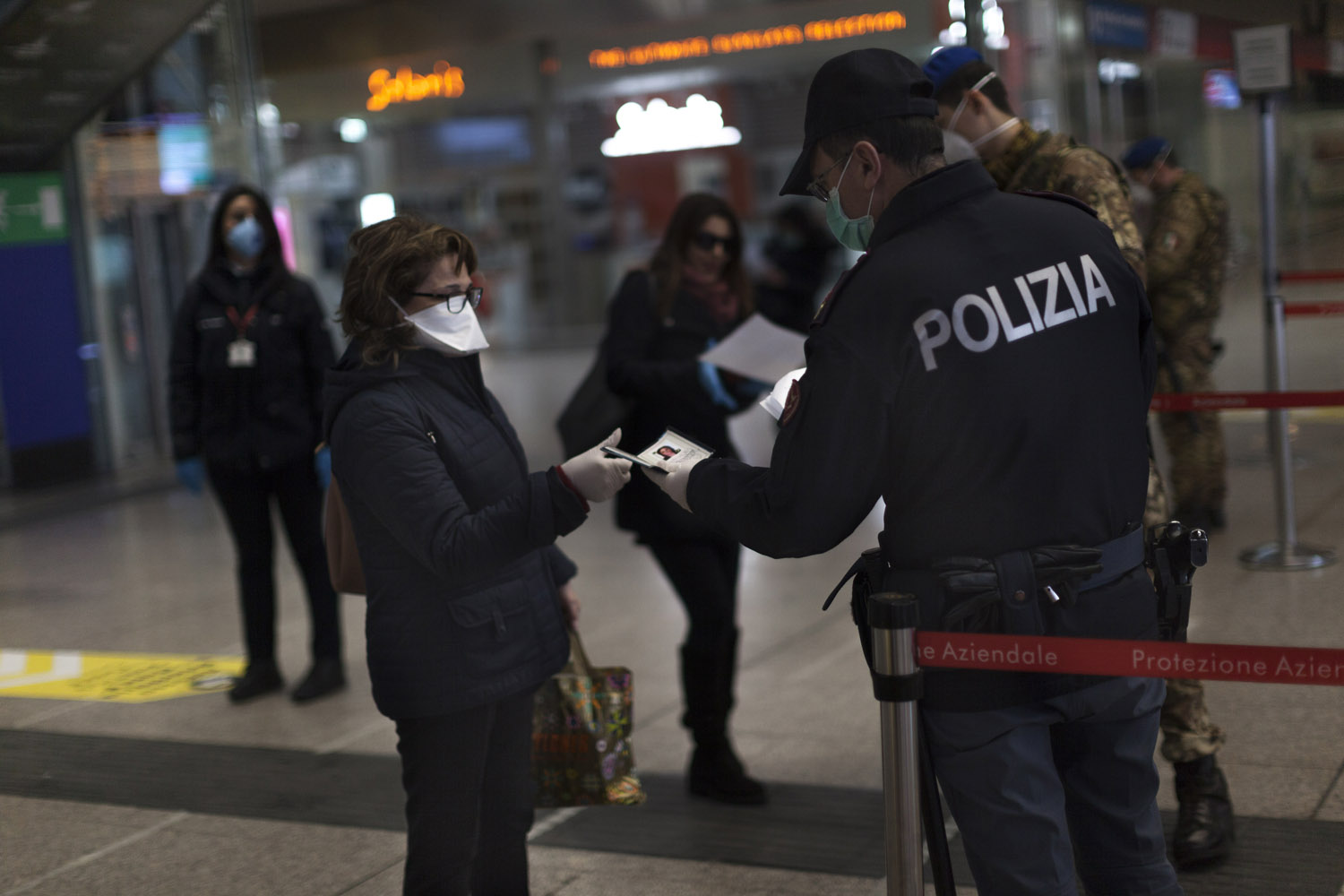
In Rome’s Termini station, police check the signed form explaining the purpose of people being outside their homes.
Text & images by
János Chialá.
Jerusalem to Puglia, March 2020
Like every toxic relationship, the one you are having with the Corona virus grew gradually, from the occasional to the very intimate. One month ago, it was little more than an interesting piece of distant news you used in conversation, to look like the informed journalist you supposedly are. Then, over the recent weeks in which the virus spread through your own country like wildfire and panic gripped the entire world, it turned into the only thing everybody talked about, all the time. It gradually took over your life and there was nothing you could do about it, or maybe you were simply in denial. Just a few days ago you were partying on Purim, wearing a mask around your eyes, and today you are frantically running around Jerusalem, going from shop to shop in search of a surgical mask to put on your mouth. The authorities are telling tourists to leave, flights are being cancelled one after the other, borders are being closed and even here in Israel a general lockdown is all but imminent. It’s time to go home, even if your home is in Italy, and the only flight you could find was to France while you live in Puglia, in the south of the country, which means you have to travel more than 1200 kilometres through the centre of a global pandemic.
You do your last round of goodbyes, walking through the streets of Musrara, and wondering when you’ll be able to return. “Don’t think about that”, you tell yourself, “and deal with one problem at the time”. With saying goodbye to the people you love, with the border that everybody tells you might be closed any time soon, with the journey across Italy, with the risk of getting infected and passing the virus on to your parents, with two weeks of strict isolation and only then with the possibility that the world as you know it might be about to end. Or maybe it has already ended, and you have been living in an irresponsible bubble of Purim-obsessed, Jerusalemite artists – your friends, with whom you are about to part for the foreseeable future. These are some of the last social interactions you will have for a while, and they live up to the circumstances. They all give you something for the journey: a spare mask, a ra’ashan to use every time someone mentions the virus, a copy of Collapse, a book about how societies fall apart “to cheer you up on the train”, a pair of good headphones and several hours of obscure experimental music, and finally two shots of some home-made Russian drink, “for disinfection”.
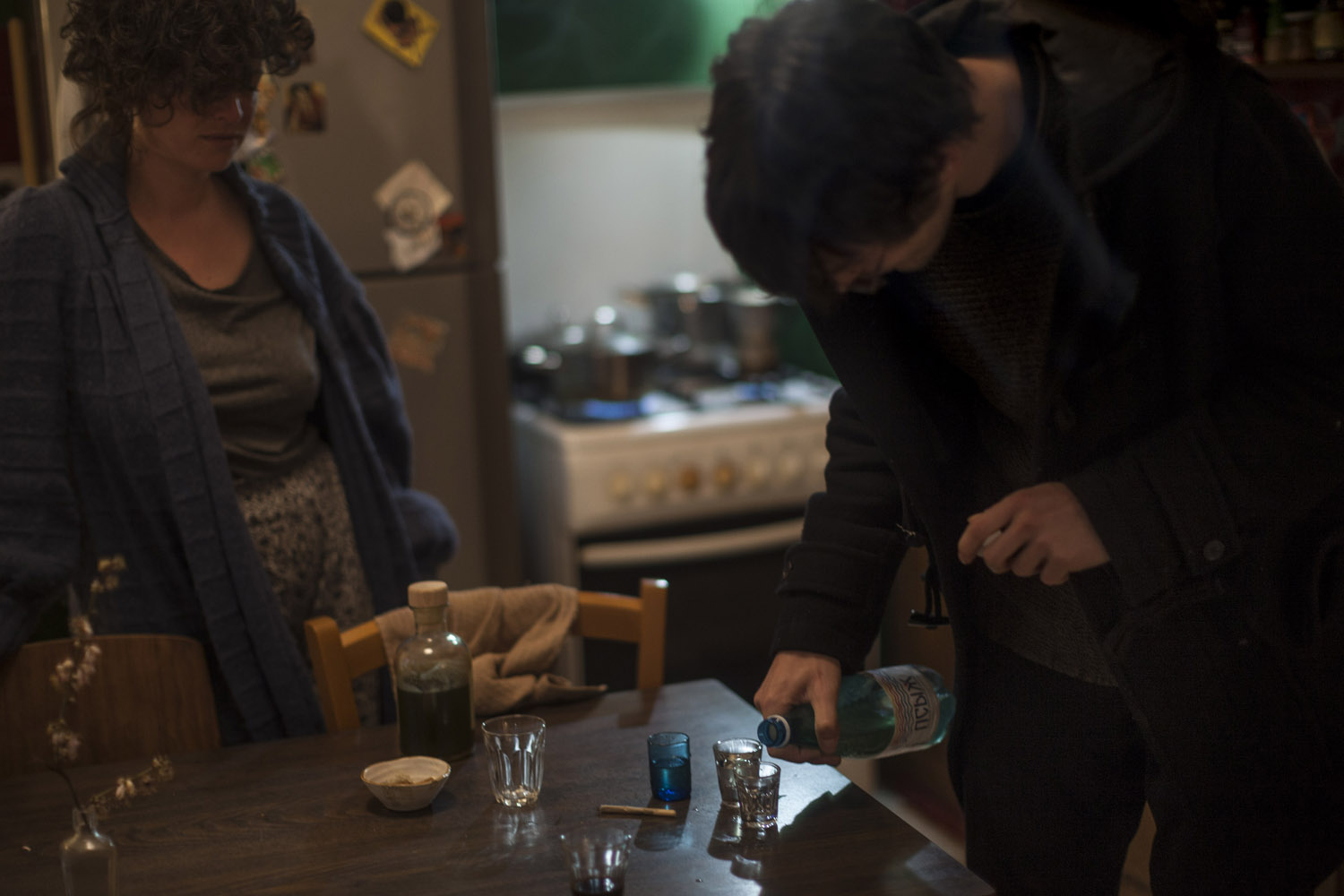
You rush through the empty train station of Jerusalem, admiring its bunker-like beauty, and on the train to the airport you see a woman putting a pair of gloves on top of another pair of gloves. In the cue for the check-in, a man complains about people not wearing masks, while a young woman shakes her head, looking like she’s about to cry. As you climb the stairs to get on the plane, you turn back and see her again, standing alone on the tarmac. Maybe she’s afraid of flying, you think, and you go ask her if she’s all right. She bursts into tears, and tells you that she’s scared, that her father is in Africa, her mother is somewhere else, and that she doesn’t know where to go once back in Europe. You tell her everything is going to be fine, and then you take her hand and walk up the stairs, together. After you are scolded for taking a photo of the hostess putting a breathing mask on top of her surgical mask, the plane takes off and the sight of Tel Aviv beneath the clouds lifts both of your moods, so the conversation switches to climate change and how this is all just a taste of what will happen within your lifetimes. In the airport of Nice, a young man comes to inquire about the well-being of the young woman. After failing to find a bus out of the airport, the three of you decide to walk to the train station, which is just a few kilometres away. It’s cold outside, and it’s midnight.
The city is absolutely empty, but you tell yourself that it’s perfectly normal at this hour. A large sign on the road flashes “Coronavirus, limit your movements”, and then you notice three figures getting closer, wearing hoodies. “Oh, let’s hope these are hospitable locals”, says the young woman, and you get a bit worried before one of them asks if you are OK. You realize they only came to help, and you think of your ex-girlfriend, whom you haven’t heard from in months, as they tell you the shortest way to the station, wish you good luck and disappear into the night. After a short while a black car stops near to you and four men come out, looking like a prog-rock cover band way past its prime. “French undercover cops”, you tell yourself as one of them takes a long puff from a vape machine. “We’re the police. You know you cannot be in streets, right?” France just declared a total lock-down, and it takes a while to explain your complicated journeys until they let you go. To try and avoid the police patrols that are swarming everywhere, you decide to walk along the beach. Looking at the waves of the Mediterranean crashing beneath the stars you all agree that this quite an experience. “How old are you?”, you ask the young woman. “Twenty-two”, she answers, “ and I feel I am too young to know what to do”. You recall what a Greek friend wrote you a few days ago, after telling you that the boat connection with Italy had been shut down just as you were about to buy a ticket to Athens: “we are sailing in uncharted waters, my friend. I really don’t know how to handle this situation”.
You arrive at the train station, which is still closed, and so you make a small camp outside, huddling on the young woman’s yoga mat. “One day somebody will ask us how we met”, she says. “Who knows when we’ll meet anybody, at all”, answers the young man. The lock-down in Italy is supposed to last at least another two weeks and a half, the Australian prime minister told his citizens to expect “serious disruption” for at least six months and somewhere you have read that this could go on for more than a year. You think of the Spanish flu and how it lasted two years, and to distract yourself you look at the photos in your camera, which are mostly from the small goodbye party your friends threw for you the night before you left Jerusalem: people dancing together, sharing drinks and laughing. The sun rises, and after many phone calls the young woman finally manages to find a friend of her parents who is willing to host her, in a small village on the French Alps. You walk her to the tram that will take her to the bus station, and just as you are hugging to say goodbye a group of masked French riot police arrives, shouting orders to disperse. The young woman jumps on the tram, and waves at you through the glass. You return to the train station to find the young man asleep on the floor, and after a while your train finally arrives. Onboard, a homeless man asks you in English what the situation is in Italy, or in Spain and Germany. “Look, it’s bad everywhere, but not as bad as Italy, which is where this train is going”. “Oh, really? I’ll be fine, anyway”, he concludes, and goes back to his seat. You fall asleep during the ride and wake up a good half an hour after the train stopped in Ventimiglia. You are in Italy, and your relationship with Corona is about to really get serious.
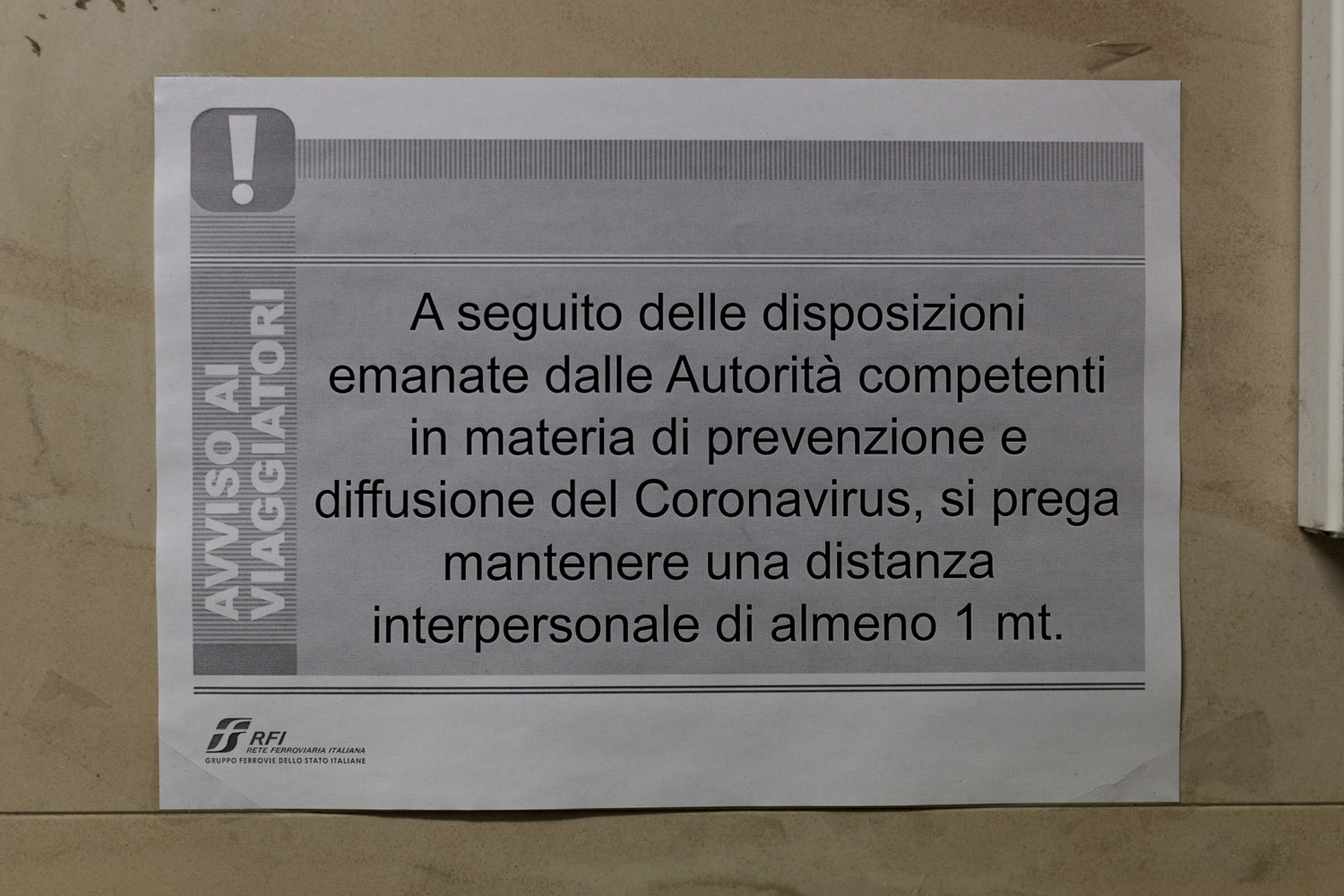
The percentage of people wearing masks has dramatically increased, and everywhere you turn there are signs telling you to keep a one-meter distance, something that is also announced by the loudspeakers, among an endless series of train cancellations, which are also meant to prevent people from meeting other people and spreading the infection, in an attempt to keep the number of sick people below the number of available intensive care hospital beds. You think about the perverse need for “social distancing” in a time of crisis, when all you want to do is be with your friends, and of the kiss you shared with one of them before leaving Jerusalem, and about how a 10-second kiss can exchange more than 80 million microorganisms. The station’s bar is still open, and once inside you see a sign says it is forbidden to consume drinks at the bar. After drinking a cappuccino, you go outside and run into a man shouting at another man: “what are you doing outside? If we go on like this we’ll be on lock-down until June!” A taxi driver is talking about someone who died the day before, then about someone else who just went bankrupt, and then about the fact that the peak of the infection will come in a week, or maybe in three. Another man passes by, a scarf wrapped around his face, talking on the phone about some new Japanese treatment for the disease, “which seems to be working.” The bells of the church ring, and it feels like the most normal thing you have ever heard in your life.
Once onboard your first train, you look around and notice that everybody is either talking on the phone or looking at one. The beautiful landscape of Liguria passes by your window, but you’re too busy staring at your own phone, scrolling through the increasingly scary news updates, answering the endless stream of friends and distant acquaintances asking how and where you are, and arguing with people from home who tell you to go back to where you came from and not bring the virus with you. On Facebook, the public enemy of the day is people who insist on going running, which is one of the few reasons for which people are still allowed to go outside. “I never saw you running once in my life”, screams the major of some small town in a viral video, “and now you’re all athletes. Stay at home!” Others complain about the “state of emergency” and about the criminalization of social contact, often quoting a recent article by Agamben which argues that the authorities are suspending civil liberties in the name of protecting people’s “bare life”. Looming above all the online chatter, the daily figures that are reported every day at 6 pm: the dead, which are now well above four hundred a day, and the number of new positives, whose rate of growth supposedly indicates how close the country is to the peak of its collective relationship with Corona.

You arrive at the train station of Genova, which is not completely empty, and yet strangely peaceful. You sit down for a coffee, not far from a man who is shouting into his phone. “What do you want me to do? I am just going home!”, while the station’s loudspeakers repeat their warnings to keep a one meter distance and their litany of train cancellations. Since yours only arrives in a few hours, you walk towards the exit, hoping to get a glimpse of the city. Temporary barriers have been set up, guiding people towards a police check-point, manned by policemen and soldiers in surgical masks, who look as if they’re undecided between shouting orders from a distance and acting normally. Under the lock-down decree, everybody is required to carry a signed form explaining the purpose of their outside their home, and the policemen are there to check these forms. Beyond the glass walls of the station, the city appears to be functioning, with buses and cars and a few people milling around.
You board your next train, and you keep reading the news, partaking in what some refer to as the world’s first full-blown “info-demic”, a perfect storm of disaster, 24-hours news cycle, social media and fake news that bears a strange relation to what is unfolding in front your eyes. The Japanese cure you heard about in front of the station of Ventimiglia, for example, shows up on the homepage of the Guardian just a few hours later, with the article noting that the shares for the company that produces it “are soaring”. You see another viral post by a biological researcher who says that since he is paid little more than one thousand euros a month and football players are paid millions, people should ask for a solution from Ronaldo and Messi. “The first one is actually in isolation”, reads one comment, “at least in this regard we’re all equal.” You smile, before realizing that quarantine must be a very different experience for a millionaire and someone who just lost their job. Just like in every toxic relationship, there are at least two elements to this epidemic, each with its own baggage: the pathogen, which simply does what pathogens do, and a vast range of human factors, which are much harder to predict, influenced as they are by history, politics and people’s personal lives. How many intensive care hospital beds does your country have? Will you be getting a salary during the quarantine, or are you a freelancer and all your jobs have been cancelled? Does the company you work for have the financial resources to weather the storm, or did it waste them on bonuses for its managers? Do you have an underlying health condition? Do you live alone in the countryside, or in a urban flat but with all your friends? Does your country even have functioning hospitals at all? Then you realize that while you were busy with your phone you missed your station, and that as a consequence you will not make it to Roma before the night. The sun has already set, and you find yourself in La Spezia.
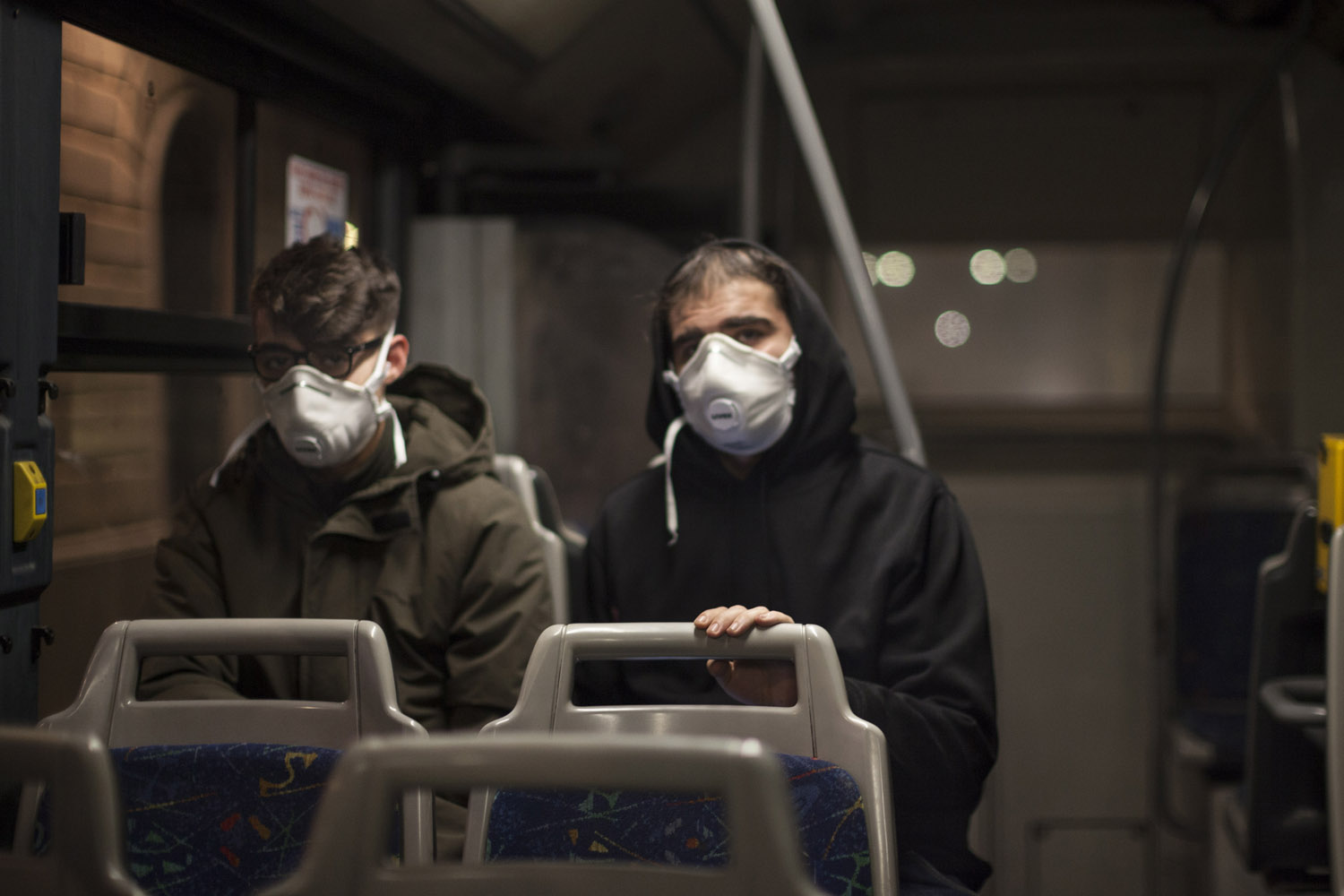
At the ticket office, the man behind the counter is reading a book, looking like the calmest person in the world. You buy your ticket but forget to ask him what is he reading, a question that will haunt you for the rest of the journey. The train is in two hours, so you look for someone to interview, while the station’s loudspeakers continue to announce train cancellations and warnings to keep a one meter distance from other people. Both of these things are also visible on dozens of screens throughout the station, and you really wish this dystopic soundtrack would end. “We are entering a new world”, says a man who agrees to talk to you, “but I have a bad feeling about how long this is going to last, and usually I am right. Anyway, we still have to understand what this thing really is. Some say it came from a bat, but I am not sure, other people say it was because the Americans launched a rocket, and what about that Chinese research lab in Wuhan”. You try to explain to him that there’s a new flu every year, that these things happen, and that anyway America is already affected too, but he remains unconvinced. “There is so much we don’t know about this virus”, he concludes, “but maybe it will make us appreciate our normal lives more, when it’s all over”.
While you look for someone who wants to talk about their personal experience instead of conspiracy theories, another man smiles at you, the first person to do so on this journey, or maybe he’s simply not wearing a mask. You are not wearing yours either, and therefore you can smile back. He is from Albania, he’s waiting for the same train as you, and he offers you a cigarette. Then he laughs and says: “you know, I literally just got out of jail.” You laugh too, and you both agree that you are witnessing a historic moment. “This is bigger than the fall of Communism”, he says. He doesn’t have a phone, so you lend him yours and he finally manages to talk to his wife and two children, who are celebrating his release back in Albania and are also under lock-down. Once he is done, he tells you about prison life in the time of Corona. “Inmates watch TV, so we knew what was happening, and everybody was very worried, but the situation was more or less fine until the prison authorities suspended all visits from the outside”. This drastic step was taken in order to prevent the infection from spreading to Italy’s overcrowded prisons, and yet it immediately sparked several deadly riots. “We all understood why they did it, but when you’re in prison a visit from your family is the only thing that keeps you sane, and once that was gone everybody went insane. In my prison they burned an entire wing, and one prisoner died”. Just as it did with the shortage of hospital beds, the virus simply brought to light a problem that already existed. That Italy’s prisons, just like its hospitals, were chronically overcrowded, under-funded and on the brink of disaster had been a known fact for years, and a short suspension of family visits proved enough to literally set them on fire.
The train arrives to Pisa, where the man’s brother is supposed to pick him up, if the police does not stop him on the way. “It was nice to be free for a few hours” he says as you walk outside the station. Again, just as you are about to say goodbye two policemen show up, shouting orders to disperse, and he quickly disappears into the night. An ambulance arrives, and two Red Cross paramedics rush into the station. After a short while they slowly walk back to the ambulance, brushing off your request for a picture. A girl arrives with a suitcase, and lets you take a portrait in her mask. You begin to feel like you’re in a zombie movie: the empty streets, the fear of contagion, the police and army everywhere, and yet there are no zombies around you. There are only people, trying to get home, going to work, or labouring to keep a semblance of order in the middle of a global pandemic.
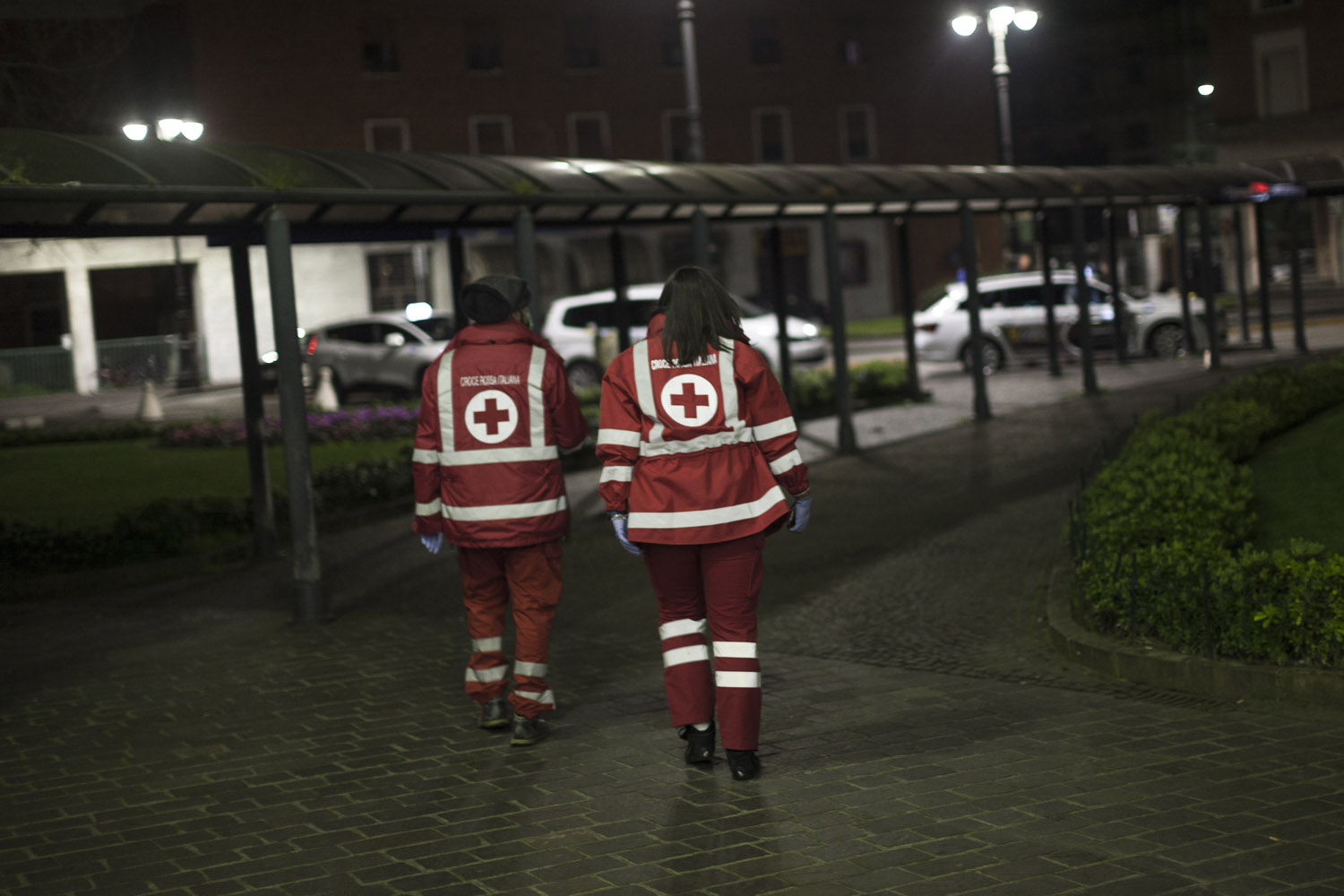
You call your uncle, who is a doctor in Rome and has offered to host you for the night. “I won’t make it there tonight, there are no more trains”, you tell him, “and anyway I shouldn’t come to your house.” You ask him what he thinks of what’s going on. “It’s a bit too early to say”, he answers, and then begins to talk about the countless factors that shape our relationships with pathogens, which are much more complex than a simple process of getting infected and developing a sickness. Past relationships, for example, play a great role: “this pandemic is killing the old, while the Spanish flu killed mostly the young”, he explains, “and one of the theories is that a few decades before that pandemic there had been a similar outbreak, and therefore older people had antibodies while the rest of the population did not”. He tells you about how the virus that causes mononucleosis can cause two completely different pathologies. “In the developed world, children tend to grow up in a hygienic environment, and therefore encounter the virus when they’re older”. Their immune system reacts, and they develop mononucleosis, which can be persistent but it’s hardly fatal, while “in places like Africa, children encounter the virus much earlier, before their immune system is developed. The virus is then able to penetrate their DNA, and several years later leads to the development of a form of cancer, known as Burkitt’s Lymphoma. The same pathogen, two completely different diseases”.
It’s getting late, and after spending a night outside the train station of Nice you’re afraid that another one in the cold would make you sick, regardless of Corona. You try a few hotels, but they’re all closed, and while you wander the empty streets someone offers to sell you some drugs. You finally find a hotel whose lights are on, and a man lets you in, apologizing for welcoming you while wearing a mask. You ask him how he is, and how is business these days. “I’m fine, but I have been involved with this hotel for more than forty years, and I have never seen anything like this. You’re our only customer tonight, and I have only one booking until May.” As he talks, his phone buzzes with one notification after the other. “I am the local coordinator of the Hoteliers’ Federation, and everybody is on Whatsapp asking me what to do. We’re all going to be bankrupt if the government doesn’t do something soon”. He has no idea for how long he will be able to stay open: “I simply took out all the money from the hotel’s bank account, and shared it equally with all my employees. This is all I have, and good luck”.
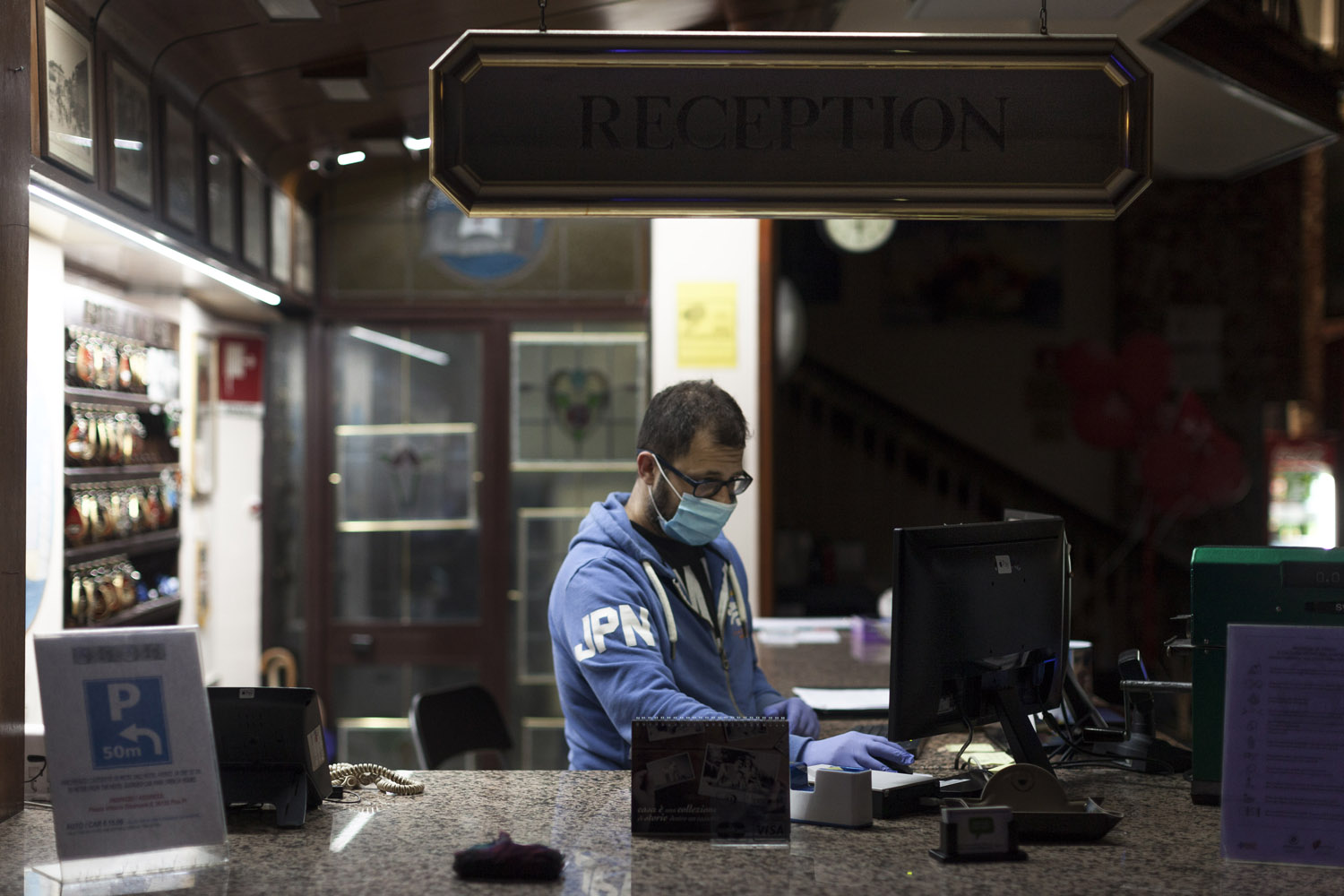
You wake up late, not recognizing where you are. You check your phone, and for the first time since you embarked on this journey there a no new messages. You ask yourself if this is a good sign, and then walk down to the reception to drop your key. The TV is on, and some expert is talking about the fact that Italian cheese is not infected and perfectly safe to consume. You walk across the square facing the station, and there are only homeless and migrants around. You wonder what quarantine means for them, and if they are as scared as you, after experiencing catastrophe on a daily basis for much of their lives. As soon as you enter the station, you hear the loudspeakers announcing train cancellations and reminding you to keep a one meter distance from other people, while the ticket machine warns you against pickpockets. The bar is closed, so instead of a coffee you buy a coke from the only shop that is still open. The cashier tells you about a nurse who killed herself the day before, after testing positive for the virus.
On the train to Roma, you find yourself surrounded by a large group of backpackers, who are playing cards and sharing jokes as if on a school trip. Just a few weeks ago they had arrived to Ecuador, where they were meant to spend a year volunteering with disabled people and children at risk. “It was the first time I experienced racism in my life”, one of them explains, “people were shouting at us in the streets because we are Italians, saying we were infected. Then people started getting sick in Ecuadors as well, and the Italian government brought us back to Italy.” While you are talking, one of the girls receives a vocal message, and lets out a cry of desperation. “It’s a friend from home, she’s freaking me out!” The message consists of a lists of all the possible worst-case scenarios should she get infected: “unlucky as you are, and with the shitty immune system that you have, you are really at risk. You have to be careful!” The girl also shows you another message, in which a friend explains to her that the epidemic is a German plot to sabotage Italy’s trade agreement with China, and that Israel already has a vaccine and is keeping it from the rest of the world. “I don’t understand how people can believe this stuff”, comments the girl. You look around, and once again everybody has a phone in their hand.

The train drives into Roma, which is the first place you are really familiar with that you encounter on this journey. The novelty effect of your new relationship is definitely wearing out, and you are starting to realize that this no longer something that is happening to other people, while you just happen to pass by. You finally arrive at Termini station, a place you crossed a thousand times, dashing through the crowds of annoying tourists. Now it is nearly empty. At the bar, the bartender cannot stop complaining about all the people that are still out in the streets: “the army, where is the army! We should do like in China, and shoot people at sight!” You don’t know if anybody actually got shot in China, and it’s not the first time you heard people invoking harsher measures or wishing we had “somebody like Putin in charge”. You drink your cappuccino, trying to ignore the loudspeakers and their endless series of train cancellations and warnings to keep your distance from other people. All around, masked people are staring at their phones, sitting at a distance from each other.
A night in Termini station is a tough experience under normal circumstances, so you decide to find another hotel, and look for a cheap one nearby. Reading the reviews on Google Maps leads you into a dark world of damp rooms, malfunctioning showers and outright scams. “The world wasn’t such a great place before Corona either”, you tell yourself as you randomly pick one of them. As you are about to make your way out of the station, you realize that supermarkets now close at seven in the afternoon, and you run to the one beneath the station just before it closes. At the entrance, an extremely polite worker tells you that it is now compulsory to wear gloves, at which point you realize that you haven’t been wearing yours since you don’t know when. You have spent most of the past 48 hours in train stations and on public transport, and your bottle of sanitizer liquid is still half full. You’re not taking this seriously, you tell yourself as you buy some food, a beer, and a yogurt-drink whose label claims to boost one’s immune system. The hotel you picked isn’t so bad after all, and from the window on the courtyard you can hear somebody watching the news: the number of new cases is rising, and hundreds of people are dying every day. You are definitely not taking this seriously enough.
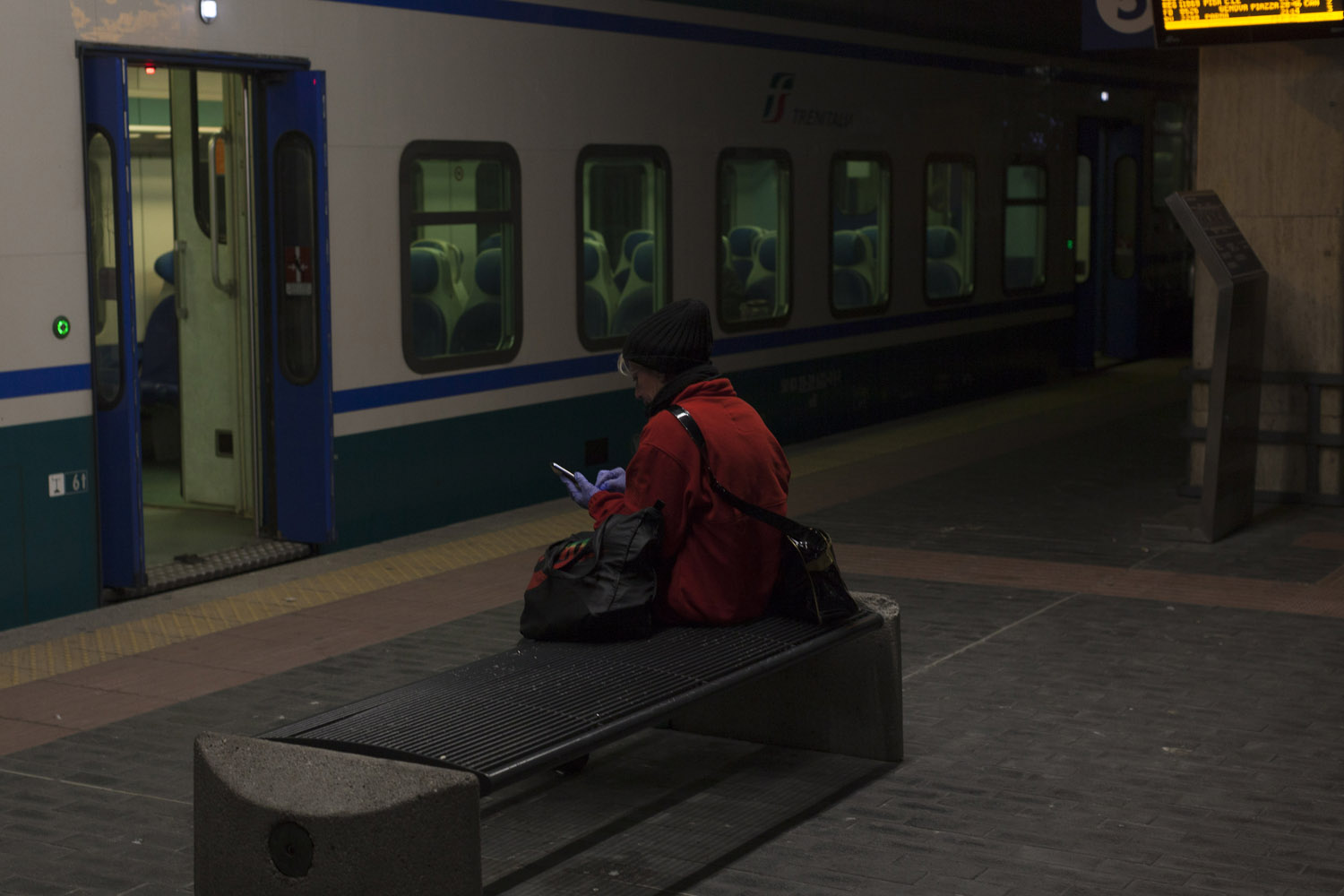
The next train is at 5:30 in the morning, so by the time you get out of the hotel it is still dark. Once onboard, the loudspeakers announce that by order of the judiciary authorities, today this train will not stop in the town of Fondi, which is experiencing a serious outbreak of the virus and has been cordoned off by the police. You find a seat, and without even noticing it you are scrolling through your Facebook feed. A journalist you know just posted a link to an article about the fact that Fondi has Europe’s second largest vegetable wholesale market, and how this is probably connected to the outbreak. Somebody is talking on the phone, explaining how people will keep wearing masks once this is over, just like they do in China and in Japan. The train races through the countryside as the dawn breaks, and the fields are wrapped in the morning mist, and a friend writes to inquire how you are, and tells you that everything is still fine in Jerusalem. Another friend sent you a series of questions: When will she be able to see her boyfriend who lives abroad? Will there be any democracy left in Israel after this? “And mainly, WTF?”
You get off in the station of Napoli, and are welcomed by the usual loudspeakers announcements. At the check-point, the policemen look tired and in a bad mood. You ask for a form, and fill it out in your terrible handwriting. The policemen you hand it to obviously cannot read it, and he angrily asks you where you’re coming from. You explain your journey, that you are going to your village, Cisternino, and he gets really angry. “So why were you on this train?” You realize that he simply has no idea where your village is, so you try to explain your journey again. He brushes you off, and tells you to get out of there. You are starting to understand what a certain people go through on a daily basis. Your next train departs from the underground station, and you get there just as commuters are getting off another local train. “People are still going to work”, you tell yourself. The train departs, and the station goes totally silent. You look around, and all the people you see are staring at their phones. Was it always like this? You don’t remember.
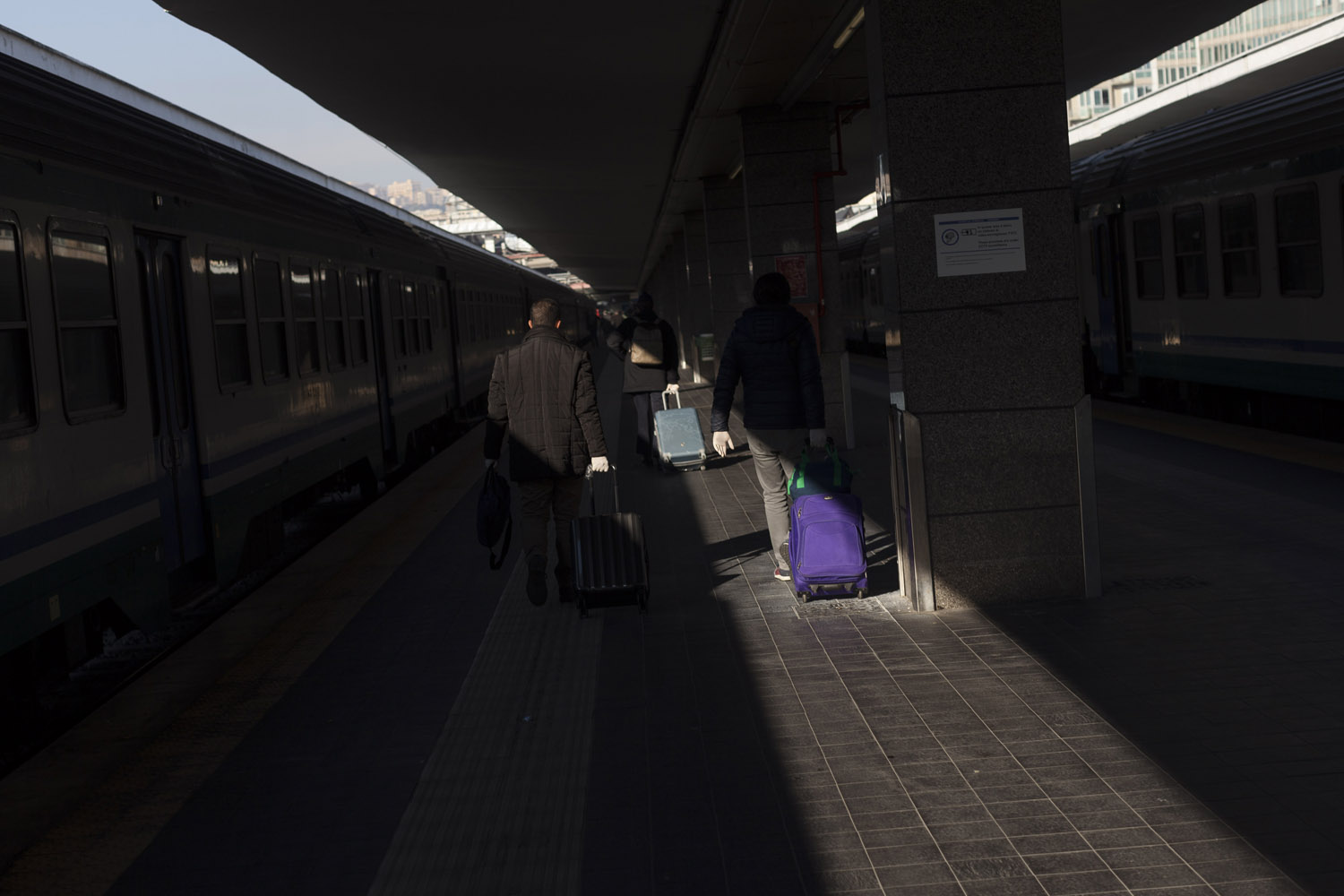
The first item on the homepage of Italy’s main newspaper is a spike in new cases of Corona in your region, Puglia, which includes “several” parents of students who returned home from the north of Italy. At first it was the Chinese “who eat dogs”, then it was the Italian businessman who came back from China, then the people who go jogging, then the Germans and now it’s the twenty-years old students who fled to their parents’ homes. Who’s next, you ask yourself. On the train, you interview an old lady, and she tells you about the images she saw on TV, about the rows of coffins and the army convoys collecting the bodies, before her voice breaks and tears come down streaming on her face. “Enough”, she says “I am too sad to talk about this, it makes me want to die”. You begin to wonder about the role of the media in this crisis as the train arrives to the station of Salerno. After yet another police checkpoint, you walk out into the sun, looking for food. An old guy who is calmly smoking a cigar gives you the directions to the closest grocery shop, which turns out to be a proper Italian alimentari, the small food shops that are a central element of Italian identity. As humus fades into a distant memory, you order a sandwich with mozzarella di bufala, and then another one. The lady at the till is taking an order for home delivery, and as soon as she hangs up she begins to mercilessly gossip about the woman she just talked to, and especially about her hair.
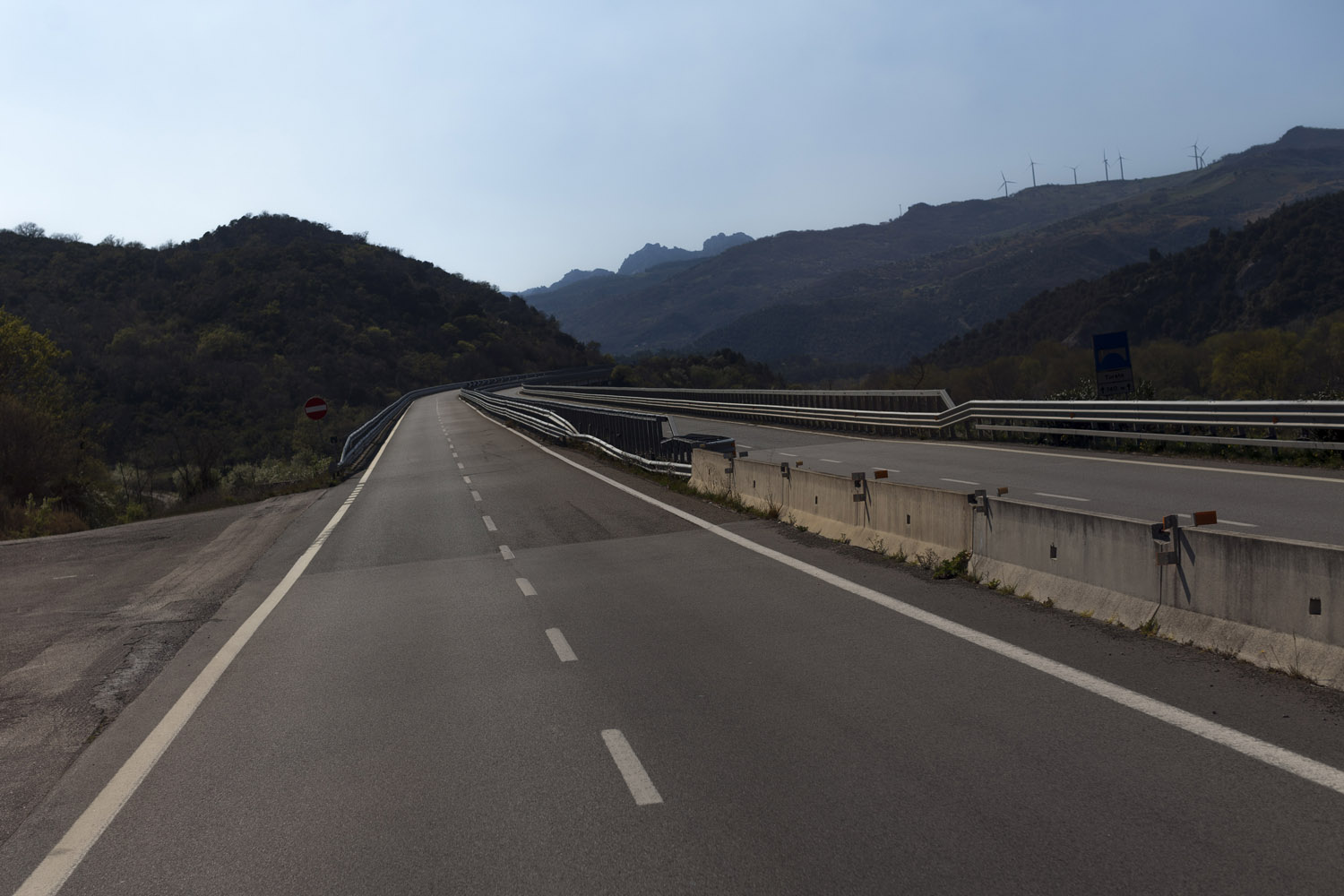
On the bus from Napoli to Taranto you loose yourself in the landscape, as you drive through some of southern Italy’s most beautiful mountains, the “Dolomites of the South”. You think about the last time you were there, a little more than a year ago, and at how much life has changed since then. At the station of Potenza, the bus driver walks with you to the bar, seemingly in a very good mood. While you drink your cappuccino, he tells the barman to cheer up, and points at a handmade sign that says “#everythingwillbefine”. “Tell it to the four employees I had to fire yesterday”, answers the barman, and an icy silence falls on the room. The bus departs towards Puglia, and on the way it stops in several small villages. Each time, a police car is waiting for you, and the driver has to explain that all the passengers have had their documents checked before departure. The roads are completely empty, except for the occasional truck, and you try to interview the other passengers, but nobody has any intention of talking to a potentially infected stranger. The bus finally arrive to Taranto, and your home is just a few kilometres away. As you get off, another passenger lets you take his portrait, and he tells you his story. “I live in the area where the outbreak began, so we were immediately put under lock-down. After two weeks I fled to a friend’s house, and had to be quarantined for two more weeks because I came from a Red Zone. Now I am going back to my parents, and I will have to spend another two weeks in quarantine”. You ask him how he feels about all this. “I am really scared. People of all ages are dying, and there is already an outbreak in my home town. It was a doctor who went to Milano, and when he came back he didn’t go into isolation and then infected several of his patients. What an idiot!” You wonder what will life be like for people like this doctor after this is over. Will people forgive them?
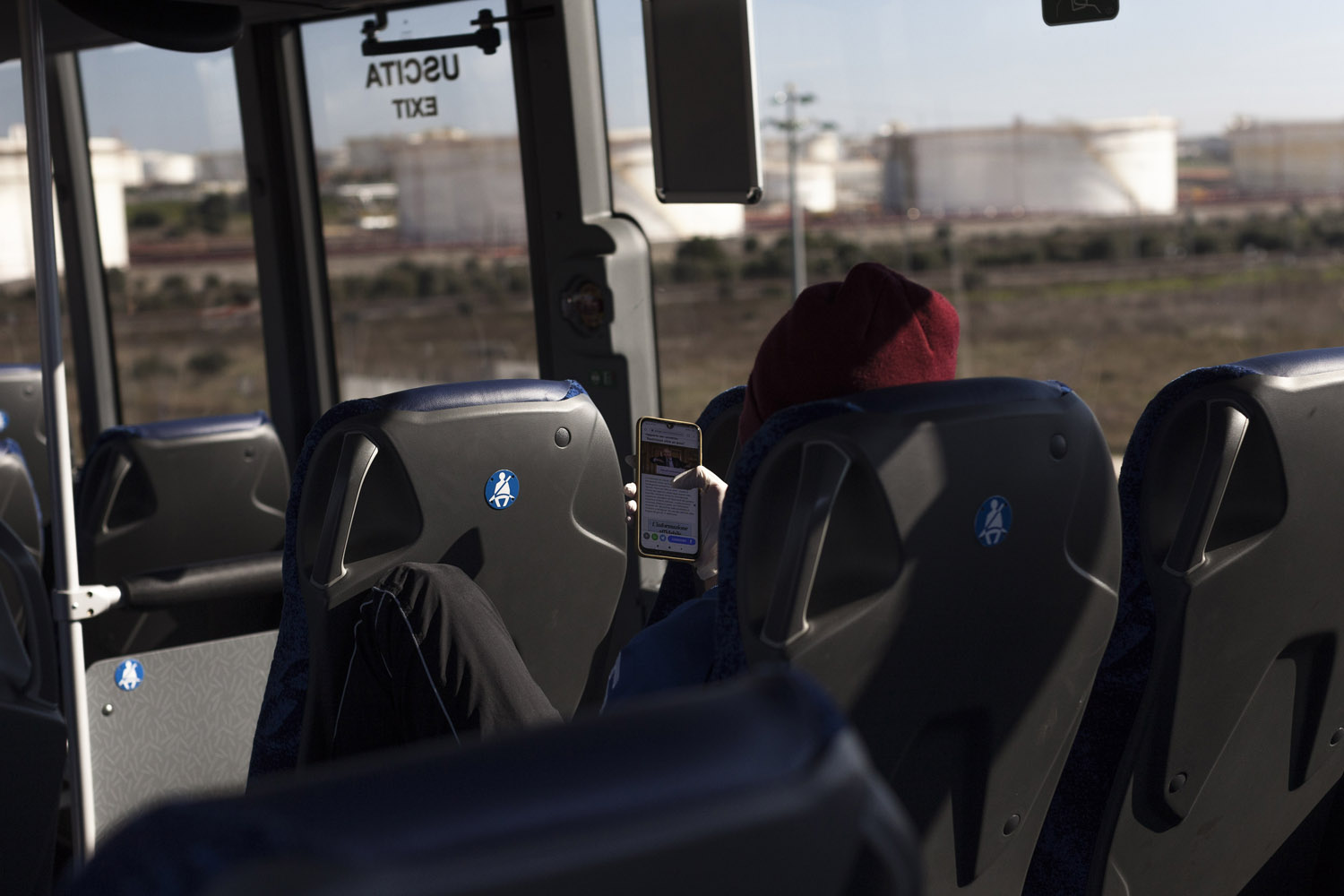
You make your way to the bus station, and once inside the ticket office, the lady behind the counter tells you that you look very tired, and asks where you are coming from. “From Jerusalem, and it took me three days to get here”. She smiles, and hands you your ticket. “You did an inverse pilgrimage, didn’t you. Welcome back!” The bus arrives, and the first person you see onboard is wearing a gas mask. You try to not sit next to anybody else, while the radio announces the casualties figures for the previous day: more than six hundred dead. The bus finally arrives to Martina, a town you went to school in for three years and which you never liked, but the sight of its empty streets and shuttered shops gives you a strange feeling, the same feeling that you began to experience in Roma: this is really no longer a piece of distant news, this is happening to you, and this is your life now. You get off the bus, and you walk out of the town, descending into the countryside on your way to your parents’ farm.
People are working in the fields, and dogs bark as you pass by. Someone behind a hedge is playing very loud trap music, to which you dance for a while, alone and surrounded by the countryside in spring. You phone keeps buzzing with Whatsapp messages. “Are you OK?”, “Did you make it home?”, “Dude, where the fuck are you?” After a long walk under the sun, you finally see your parents’ farm. You take a photo of your favourite olive tree, and then your father calls your name. You take a selfie to send to your friends, and right after you send it to the last person your phone battery finally dies. In the evening, as your parents are having dinner inside the house, you sit down on your new bed in the small wooden hut where you will spend your quarantine, and write the last page of your travel diary. “We might be living in the time of Corona, but I was out there and saw it with my own eyes: tomorrow morning people will wake up, get out of bed and, whatever their circumstances, they will keep on doing what they have been doing since the day they were born, with all their failings, all their fears and all their contradictions – being human.”
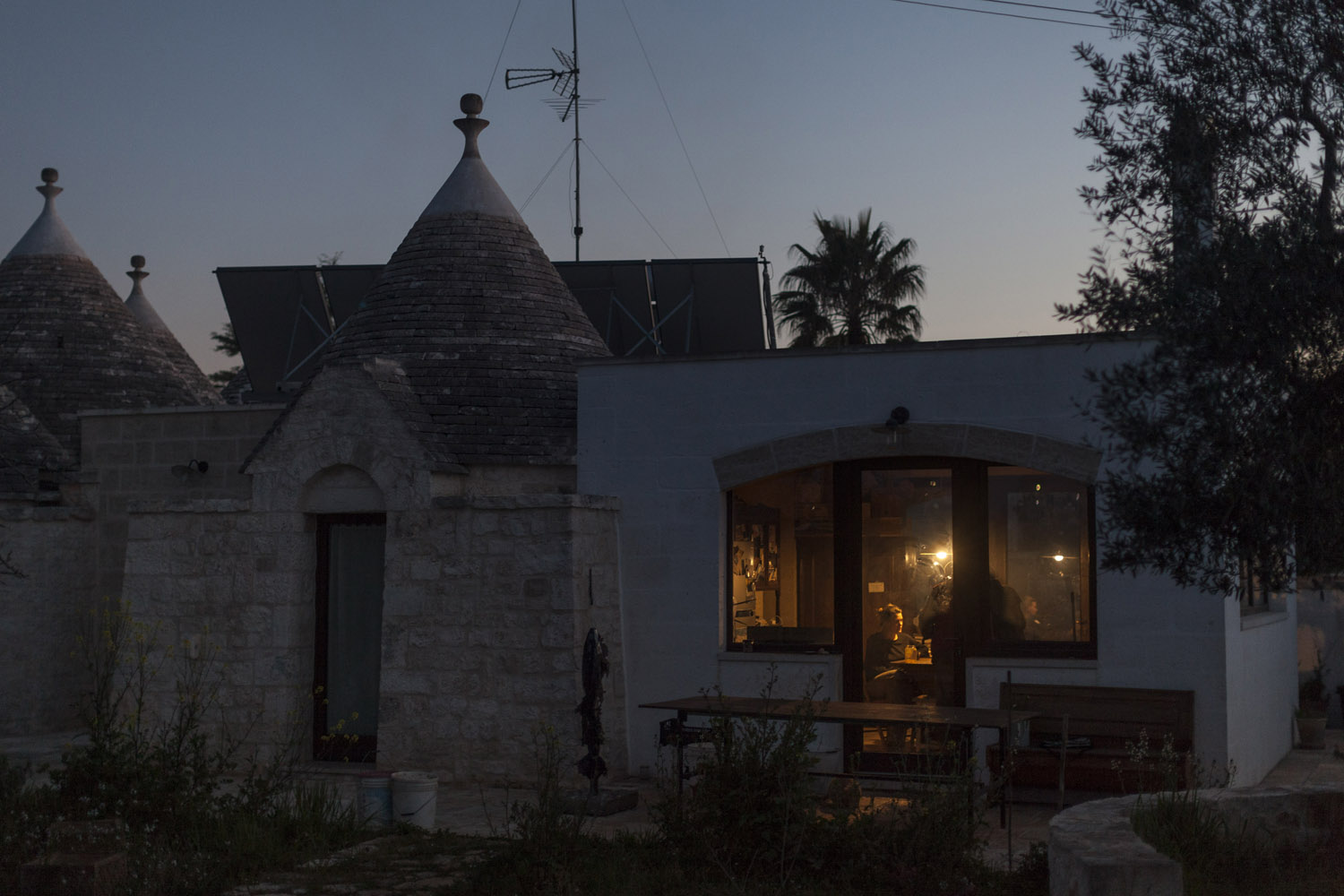
Published on Ha’aretz